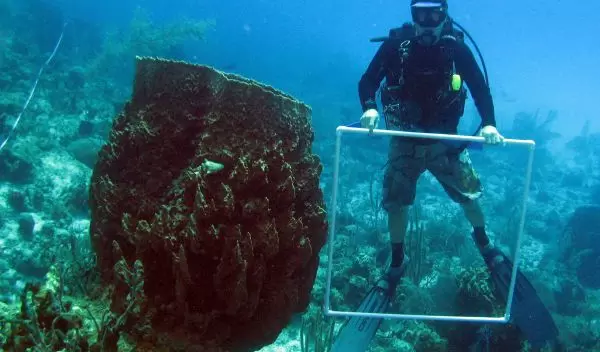
Life on a Coral Reef: Insult Is (Sometimes) Added to Injury
When is insult added to injury for a Caribbean coral reef?
When overfishing removes predatory fish that feed on sponges, according to results reported this week in the journal PLOS ONE.
Using the undersea habitat Aquarius--moored on Conch Reef off Key Largo, Fla.--marine scientist Joseph Pawlik of the University of North Carolina Wilmington (UNCW) and colleagues found that these predator fish are the same brightly colored angelfish and parrotfish that attract scuba divers and glass-bottom boat tourists.
Pawlik is first author of the PLOS ONE paper; co-authors, all from UNCW, are Tse-Lynn Loh, Steven McMurray and Christopher Finelli.
Chemical warfare beneath the waves
The fish prey on sponges without chemical defenses--sponges missing what might be called the "yuk factor."
"Sponges that manufacture metabolites that are distasteful to fish are largely left alone," says Pawlik.
"That being said, when overfishing by humans removes these predatory fish, reefs shift toward faster growing sponges that can out compete reef corals for space.
"That further hinders corals' chances of recovery."
Coral cover on Caribbean reefs is at historic lows due to disease, heat stress from warming waters and waves from storms.
Undersea garden of sponges
"Coral reefs, especially in the Caribbean, have undergone many changes in the past few decades," says David Garrison, a program director in the National Science Foundation's (NSF) Division of Ocean Sciences, which funded the research.
"With the decline of reef-building corals, sponges are becoming the main organisms on many reefs. These findings provide important information about interactions between sponges and predatory fish in coral reef communities."
Previous research showed that Caribbean sponge communities were primarily structured by the availability of plankton, or tiny floating plants and animals, rather than by predators.
But sponge growth experiments performed by Pawlik and colleagues--research that used cages to exclude predators--show the opposite.
"Overfished reefs that lack spongivores [sponge-eating fish] soon become dominated by faster growing, chemically undefended sponge species, which better compete for space with reef-building corals," says Pawlik.
Endangered corals: threatened by "new game in town"?
That has implications for fisheries management throughout the Caribbean.
"Some coral species are listed as critically endangered on the IUCN [International Union for Conservation of Nature] Red List, with four reef-building corals on the top 10 list for risk of extinction."
Sponges are already overrunning certain coral reefs.
"As the effects of climate change and ocean acidification disrupt marine communities," says Pawlik, "it's likely that reef-building corals will suffer greater harm than sponges, which don't form at-risk limestone skeletons [as corals do]."
Hence, he believes, Caribbean reefs of the future are likely to be made up increasingly of sponges.
Scuba divers and glass-bottom boat tourists may visit not to view coral reefs, but to see the new game in town: the sponges.
